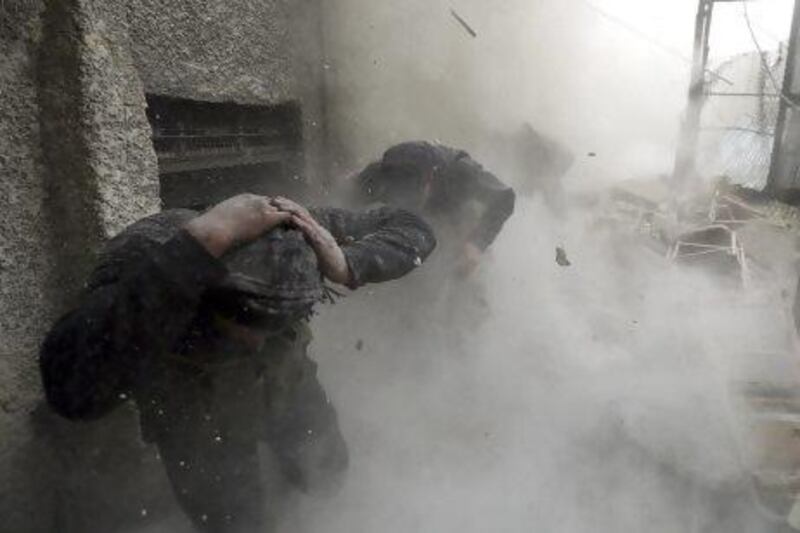RAMALLAH // Israel's raids in Syria served notice to longtime enemies that any attempt to reorder the region's military balance will be met with force, analysts say.
In its first strikes at Syria since purportedly attacking it in 2007, Israel was warning Bashar Al Assad, Iranian president Mahmoud Ahmadinejad and Hizbollah's Hassan Nasrullah that it would not tolerate efforts to strengthen its foes as the Assad regime crumbles.
There were conflicting reports about the number of attacks and their targets during Israel's incursion on Wednesday.
Syria said Israeli jets bombed a scientific research facility in Jamalya, near Damascus.
Diplomatic sources in the Middle East and US said the attacks hit Syrian lorries believed to be carrying anti-aircraft weapons to Hizbollah in Lebanon.
"I think Israel would certainly react if instability meant that the Syrian government's chemical arsenals could somehow fall into hands of non-state actors," said Mark Heller a principal research associate at the Institute for National Security Studies in Tel Aviv.
The Israeli government neither confirmed nor denied the strikes.
Only Russia, Iran and Hizbollah joined the Syrian government yesterday in denouncing the airstrikes.
Tehran and Damascus threatened retaliation and Moscow called the attacks a "brazen" breach of the UN Charter and international law.
There was no condemnation of the attack from other Arab governments, which have repeatedly called for Mr Al Assad to step aside.
The 22-month civil war has left at least 60,000 people dead and forced another 700,000 to flee Syria.
The timing of the military operation was critical. Lakhdar Brahimi, the UN and Arab League special envoy for Syria, warned this week that the nation was "breaking up before everyone's eyes".
There are now fears that tacit understandings that have maintained a shaky peace between Syria, Lebanon and Israel are now threatening to unravel.
In recent months, Israel has raised the alarm over Syria's arsenal of chemical weapons. In 2007, Israel took action to deter Syria from obtaining nuclear weapons, striking a plant in the east of country where it believed they were under development.
Just as worrying for Israel are some conventional weapons, such as Syria's Russian-made anti-aircraft missiles.
The four-week war against Lebanon in 2006 left up to 1,300 Lebanese and 165 Israelis dead, and northern Israel battered by surface-to-surface rockets from Hizbollah.
Two years later, the Israeli government of prime minister Ehud Olmert made it clear that any Syrian transfer to Hizbollah of "anti-aircraft missiles, anti-ship missiles or long-range precision surface-to-surface missiles" would trigger a military response.
The Islamist movement is thought to have replenished its supply of surface-to-surface rockets since the end of the war. For Israel, any addition of anti-aircraft missiles would be an unacceptable change in the military balance, Mr Heller said.
"Israel feels it needs to have unchallenged air superiority in Lebanese airspace, firstly to have a sense of what's going on in Lebanon by gathering intelligence from overhead," he said.
"Secondly, in the event of an escalation and hostility, it needs to be able to try to neutralise as quickly as possible the bulk of Hizbollah's long-range, ground-to-ground missiles."
Yet with Syria becoming more chaotic each week, the traditional red lines may be on ever shakier ground, one analyst said.
An increasingly desperate Mr Al Assad may try to provoke a large-scale Israeli military response in a bid to force other Arab governments to come to his aid, suggested Zakaria Al Qaq, a professor of security studies at Al Quds University in Jerusalem.
"This could push all the Arab countries into a corner, because look, now Syria is engaged with Israel, the arch-enemy," he said.
twitter: For breaking news from the Gulf, the Middle East and around the globe follow The National World. Follow us





